#New and Selected Poems: Volume Two
Quote
In the deep fall
don’t you imagine the leaves think how
comfortable it will be to touch
the earth instead of the
nothingness of air and the endless
freshets of wind? (…)
Mary Oliver, from Song For Autumn in “New And Selected Poems: Volume Two”
#poetry#mary oliver#song for autumn#new and selected poems: volume two#literature#poem#lit#from my collection
936 notes
·
View notes
Text

Mary Oliver, from "Lead" as published in New and Selected Poems: Volume Two (2007)
[Begin Image ID] A photo of a poem excerpt from a book. The poem reads: "I tell you this / to break your heart, / by which I mean only / that it break open and never close again / to the rest of the world." [/End Image ID]
55 notes
·
View notes
Note
Hi! if you're still doing bibliomancy, a friend recently told me he's in love with me while being very selfish -he sent the message shortly before i had an important job interview he knew about- only naming as reasons for this 'love' nice things i do for him and how much i support him in hard times, not a single thing about me as a person. I felt like he was being a bad friend, but is it worth it telling him it hurt me?
i believe comfort, though you craved it, was forever a stranger. i believe music had to be melancholy or not at all. i believe no trinket, no precious metal, shone so bright as your bitterness.
#my two cents is to say yeah that’s fucked up#sorry anon!#this is mary oliver#from new and selected poems volume one
2 notes
·
View notes
Note
hiii!! can you please make a web weaving post inspired by anaïs nin's quote "i watched life and wanted to be a part of it but found it painfully difficult." <3 <3

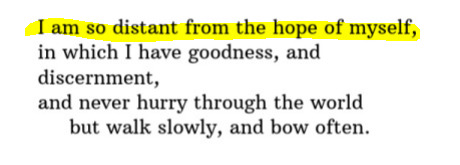
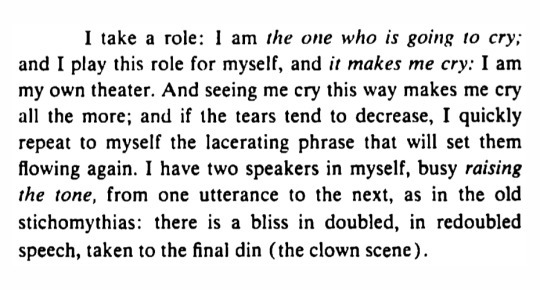

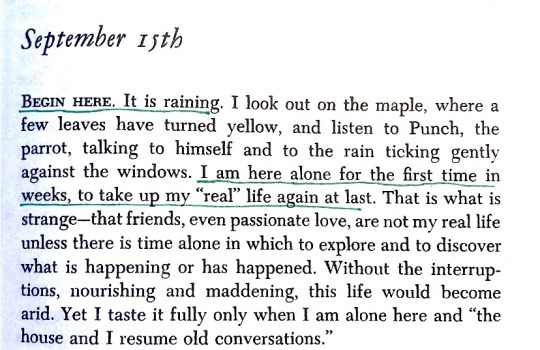



anaïs nin the diary of anaïs nin, vol 6: 1955-1966 \\ mary oliver thirst: "when i am among the trees" \\ roland barthes a lover's discourse: fragments (via @funeral) \\ paula carter dna communiqué \\ may sarton diary of a solitude (via @222tender) \\ mahmoud darwish if i were another (via @astereaus) \\ mary oliver devotions: "tecumseh" (via @weltenwellen) \\ mary oliver new and selected poems, volume two: "work sometimes" (via @weltenwellen)
kofi
#asks#anonymous#on life#on self#on identity#on living#webweaving#web weaving#webweave#web weave#ww#my webweaving#mine#parallel#parallels#parallelism#web#webs#compilation#compilations#comparative#comparatives#intertext#intertextuality#mahmoud darwish#if i were another#anais nin#anaïs nin#the diary of anais nin#the diary of anaïs nin
710 notes
·
View notes
Note
Hello! I was wondering if you could recommend any identity porn fics for ineffable husbands?
Hi! You can check our #mistaken identity tag for fics like this. Here are some more to add to the collection...
Entertaining Angels Unawares by cyankelpie (T)
Thanks to some experimental magic from Upstairs, Aziraphale has a chance to interact with Crowley without being recognized. A bit of flirting couldn't hurt, right? It's not as if anyone will ever know it was him, and there is a lot he's wanted to say and do for a very long time.
It isn't his fault Crowley is so good at his job.
Of Celestial Sonnets and Pitiable Poets by triedunture (T)
Crowley takes to anonymously publishing his poems with...unexpected results.
The Bookseller and the Garden by oceantears (T)
A very normal bookseller and a very human garden- uh, gardener go on a date. It goes great, as do the next few dates. As does their developing relationship as a whole. It would go even better, of course, if only those two could admit to each other that they are, in fact, not exactly human. That would explain some off the oddities, at least, without them constantly having to come up with increasingly complicated excuses.
But, oh well. They have made it so far, haven’t they? That has to mean they are just really good at hiding their true identities. Right?
…Right?
The Pimpernel by rfsmiley (T)
Aziraphale longs to know the identity of the elusive Scarlet Pimpernel, but Crowley, damn him, keeps getting in the way.
Readings From the Books of Ashtoreth by Quefish (E)
Vicar Aziraphale Bookman has a comfortable life. He lives in and serves the small village community of Tadfield. He enjoys contributing to local businesses, taking walks, and of course reading. His 'guilty pleasure', which gives him no guilt and all pleasure, is a series of novels by one AJ Ashtoreth. But what happens when he reaches out with an innocent bit of fanmail?
An Absence of Stars by mllekurtz (E)
A.Z. Fell is a famous (well, in his circle) Soho bookseller whose selection of volumes is the epitome of respectable (and boring) literature. One of his favourite authors is the renowned science writer A.J. Crowley, whose books on astronomy have popularized the subject — and also sell very well.
Mr Fell is overjoyed when Dr Crowley accepts his invitation to do a signing of his new book in the bookshop, but their first conversation is a disaster: for some reason, Crowley does not share Fell’s distaste for romantic literature and acts very cold when the bookseller berates the author of one of the most popular romance series of the moment, Madame Ashtoreth.
Little does Fell know that his favourite writer and the one he hates with a passion are the same person…
- Mod D
153 notes
·
View notes
Note
hey mim! i don't have really any poetry books at my house but ive been wanting to get a few. do you have any suggestions or ideas for what i should get? i don't have that much to spend so it'll only be a few books, and because it's a few im wondering if you have any favorites or anything you consider essential to have. asking because you have really excellent taste and i personally mostly read indivual poems (by usually really never the same author) rather than any sort of collections or whatever.
hello anon 🌹
I think if you can tell me which of the poems you've read that you've loved the most I can help a bit more but otherwise, if you are prone to reading individual poems more so than a single collection, then a poetry anthology is a v good thing to have at hand! Ones I've really enjoyed are A Book of Luminous Things: An International Anthology of Poetry (ed by Czeslaw Milosz whom I love), The Ecco Anthology of International Poetry (ed. Ilya Kaminsky whom I also adore) and Staying Alive: Unreal Poems for Unreal Times--the latter is part of a trilogy which includes Being Alive and Staying Human, as well as a fourth volume which brings together different poems from the three books, and might be a good way to experience the trilogy if you're on a budget!
Otherwise I don't have essentials, only ones that have really spoken to me--this may be different for you so I would def recommend testing the waters a little by finding some poems from the following poets online--I've probably posted a fair amount of them on my blog, too, I think--and see how you feel about them. In any case, some collections I've really enjoyed were: What the Living Do by Marie Howe, Sonnets and Elegies by Rilke, The Half-Finished Heaven by Tomas Tranströmer, Poppies in July by Sujata Bhatt, Devotions / Felicity by Mary Oliver, Bright Dead Things by Ada Limón, View with a Grain of Sand by Wislawa Szymborska, Concerning the Book That is the Body of the Beloved by Gregory Orr, Tell me / What is This Thing Called Love by Kim Addonzio, Deaf Republic by Ilya Kaminsky, A Tree Within / A Tale of Two Gardens by Octavio Paz, Almond Blossoms and Beyond / Memory for Forgetfulness: August, Beirut, 1982 (Mahmoud Darwish), Selected Poems by Paul Eluard
Also, and I don't know where you are in the world or how much books will usually cost there so this will depend on availability etc, but I do think a good idea for when you're trying to find books on a budget (and which is what I did at the start and STILL do), if it's something feasible for you, is to try and locate any secondhand booksellers near you and spend some time browsing the poetry section if they have one. Take your time with them, leaf through a few, or read a handful of the poems and see what speaks to you (it's also a good way of stumbling across something you may not otherwise have discovered).
I rarely, if ever, order my books off am*z*n but I'm also lucky enough to live in a place with very good access to secondhand / independent booksellers so I know this isn't always feasible for everyone. But if you are ordering your books online, and if their selections fall within your budget, I highly recommend world of books or better world books -- again, I don't know where you live or how shipping / delivery costs would work out for you but they're a very good place for secondhand (and new) literature at a lower price if you don't have access to those in person. I hope some of this helps, but again, please feel free to come back and tell me what some of your most loved poems are or if there are uniting themes / styles in the poems you enjoy most! I hope this helps in any case and best of luck, anon 💗
59 notes
·
View notes
Text
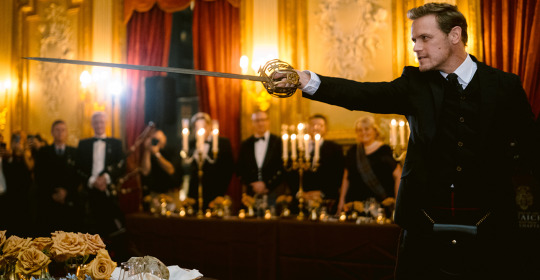
Celebrating Scotch Whisky In Style
October 5, 2023 –––––– Julia Higgins
Bagpipes, haggis, and drams, oh my! Some of the biggest names in scotch whisky gathered at a private members club in New York City on October 4 to toast Scotland’s national spirit. This was the second banquet of the U.S. chapter of the Keepers of the Quaich, the Edinburgh-based group that recognizes those who work, write, and otherwise spread the good word about scotch.
The Keepers of the Quaich (pronounced kwaik) was founded in 1988 as a celebration of Scottish culture, tradition, and whisky, and those who have contributed to its success. Marvin R. Shanken, editor and publisher of Whisky Advocate, was inducted into the Keepers in at the group’s ceremony in that first year at Blair Castle in Scotland, and today serves as vice chair of the USA chapter.
At last night’s gala, Scotch whisky luminaries were aplenty, starting with the cocktail hour. There were rarefied pours from Laphroaig (Single Cask—The Jack Rose and Ian Hunter 33 year old) and Bowmore (30 year old and Aston Martin Masters’ Selection 22 year old); Johnnie Walker (Blue Label and Umami, a new Blue Label expression), Mortlach (2023 Special Release “The Katana’s Edge”), and Lagavulin (12 year old “The Ink of Legends” 2023 Special Release). There were also drams of The Macallan (Rare Cask) and Glenrothes (18 year old), and many, many more.
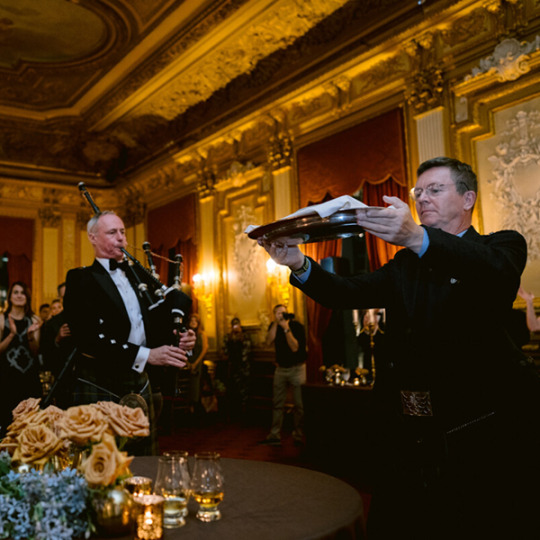
After cocktails, a formal dinner was kicked off by a procession of bagpipes, followed by remarks from Keepers of the Quaich USA co-chair Frank Coleman and co-chair Ed Pilkington of Diageo. A ceremony of bagpipes and a haggis followed soon thereafter, with Scotsman Andrew Weir giving a spirited recitation of “Address to a Haggis,” the famed poem written in 1787 by Scotland’s national poet Robert Burns. Addressing the haggis is a centuries-old tradition for Scots that started in 1801 to celebrate Burns’ life, following his untimely death at age 37. (Haggis is a thoroughly Scottish dish that consists of sheep offal thickened with oatmeal and flavored with onion, fat, and peppery spices; it’s often served with “neeps and tatties,” otherwise known as rutabaga and potatoes, as well as whisky, of course.) Midway through Weir’s address, Scottish actor Sam Heughan of “Outlander” fame joined the fray—Heughan was the evening’s guest of honor and keynote speaker, and also has a whisky brand of his own, The Sassenach blended scotch.
Addressing the haggis was one of numerous interludes throughout the evening, as a series of speakers took the floor for toasts. The first toast featured the presentation of a Scottish quaich. While we drink out of glasses today, centuries ago the quaich—a shallow, two-handled drinking vessel—was used by the Scots. The quaich’s two-handled design is often seen as a symbol of fellowship and trust, and has earned it the name “Cup of Friendship.”

Pilkington and vice chair Wayne Chaplin (also president and CEO of distribution giant Southern Glazer's Wine & Spirits) then gave a toast to the scotch industry, citing its growth and staggering volume numbers. “Scottish culture is a cornerstone of scotch whisky, and we are delighted to keep the storied traditions alive with the annual Keepers of the Quaich USA events,” said Pilkington.
The remarks were followed by a toast to Scotland from Chris Thomson, head of Scottish Government in the USA, and later, a charitable presentation from Paul Ross, CEO of Edrington America, and Rory Hedderly, head of business development at the Entrepreneurial Scotland Foundation, who outlined the evening’s beneficiary—the Entrepreneurial Scotland Foundation. Heughan, introduced by chapter secretary and senior director of premium seed brands marketing at Beam Suntory Kathleen DiBenedetto, then gave a spirited keynote address. As the night wound down, Coleman took to the podium once more to recognize leaders of the industry, and finally, Dewar’s scotch whisky vice president Brian Cox made the closing remarks.
The Keepers induct new members at ceremonies held in spring and fall, and only at Blair Castle in Scotland. To qualify, potential new Keepers must have worked in scotch whisky for a minimum of seven years, and must be recommended to the society by at least two existing members.
32 notes
·
View notes
Text
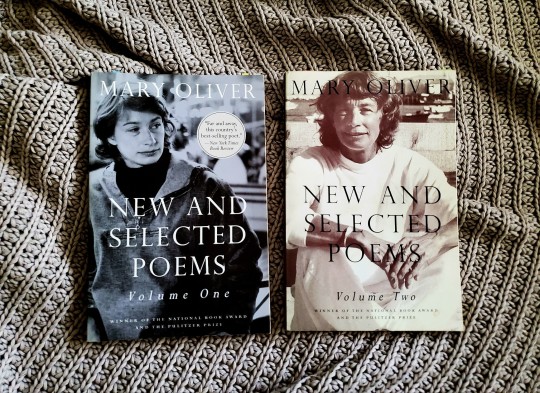
JOMP Book Photo Challenge || October 8 || Matching Covers:
New and Selected Poems Volumes One & Two by Mary Oliver
#Mary Oliver#justonemorepage#jompbpc#book photo challenge#book photography#books#Not Out of Void But Out of Chaos
37 notes
·
View notes
Text
What are we sure of? Happiness isn't a town on a map, or an early arrival, or a job well done, but good work ongoing.
— Mary Oliver, from "Work, Sometimes", New and Selected Poems, Volume Two (Beacon Press; April 15, 2004)
12 notes
·
View notes
Text
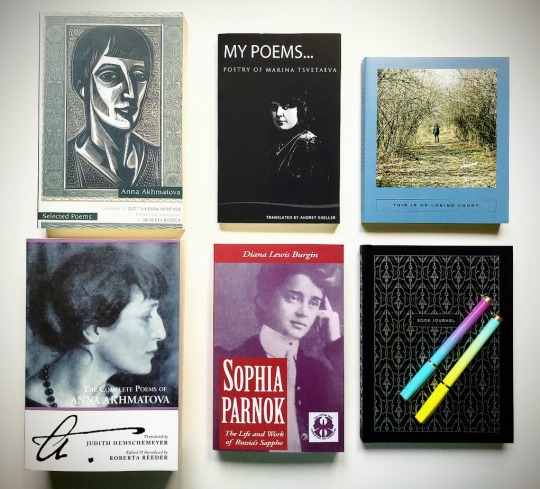
Russian Poetry!; Or, Birthday Gifts, Plus Some.
I studied Russian in college and, despite my Duolingo efforts, miss it, so I figured the most approachable way to Get Back Into That was to read dual-language poetry. Rationales: It's nice to have someone (read: the translator) hold your hand when you're out of practice; Poems Smaller than Novels or Short Stories and therefore bite-sized/less intimidating; I can do a couple poems a session without risking Losing The Plot like I might for fiction (and isn't that how you're supposed to enjoy poetry anyway??); I can take notes and jot down new vocab words in this handy little journal! (Do I read much poetry in English? No. Are we ignoring that? Very much yes, thanks.)
The three books on the top are Actually Dual Language, with Russian on one page and English facing. THIS IS US LOSING COUNT is contemporary, but Akhmatova and Tsvetaeva are decidedly not, so I'll be starting with LOSING COUNT.
The two on the bottom are English only, but the whopping 948-page complete Akhmatova as All Her Poems, plus context, which will definitely be helpful (the Selected Akhmatova above is a companion volume!), and the Parnok is a combination of context + translated poems and she was a lesbian, Harold.
I'm planning on making a year(s)-long (however long it takes!) study of this, and chipping at it regularly. Expect to see volumes pop up in my "Books of [Year]" posts intermittently!
#books#book photography#my photography#russian poetry#anna akhmatova#marina tsvetaeva#sophia parnok#this is us losing count#please know that the complete akhmatova came shrinkwrapped lmao#apparently 948 pages is SO Many that they wrap it separately prior to shipping haha#(selected did not have this problem)#i am excited for this! my grammar is shit and i know poetry is a fuzzy way to practice that buuuut#we'll see lmao#i want the language practice and i don't think apps are quite it for me#i mean they Help but they don't make me do deep focus#i miss the deep focus of hauling my russian copy of onegin into the library to read the nabokov translation side by side#so we'll replicate that in individual book form :)#i am gonna have to try to look up the parnok poems in russian though#i thought those were presented in this book too but i did some flipping and i think they might not be :(#will check the notes and see if i can find them online though!!
2 notes
·
View notes
Text
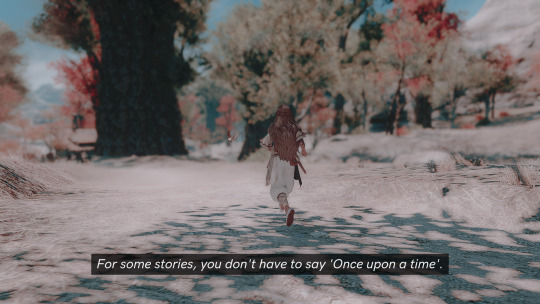

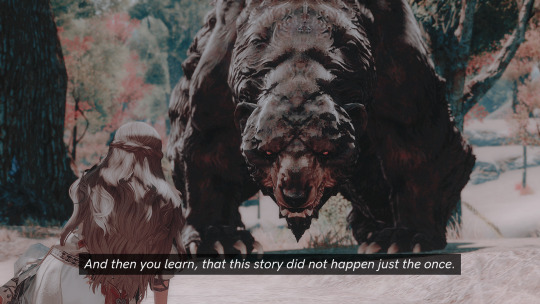
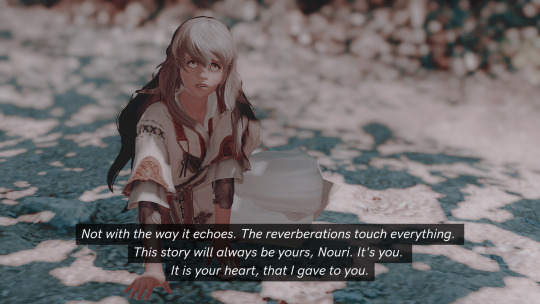
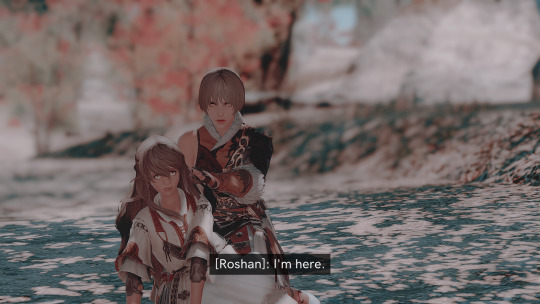
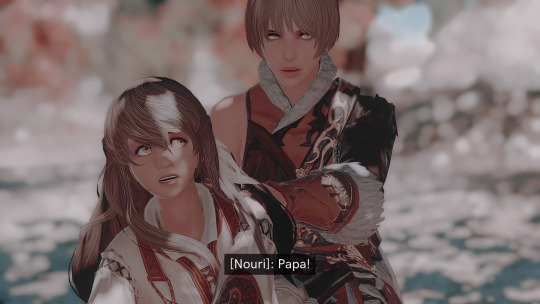
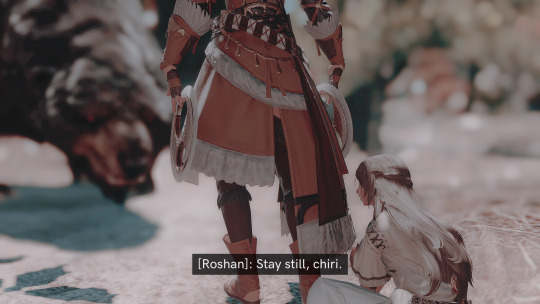
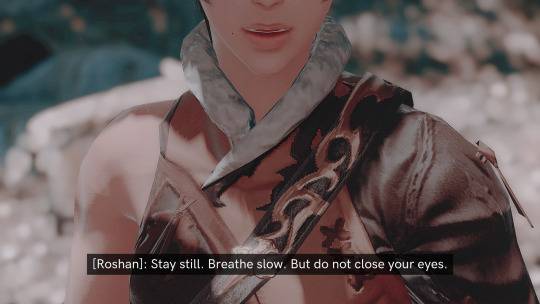
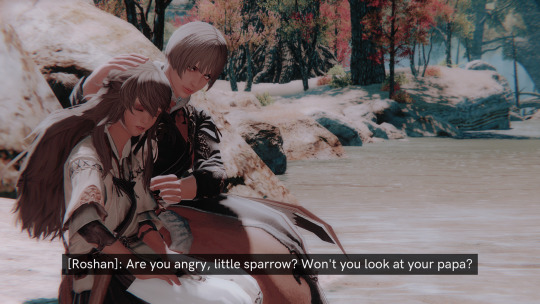
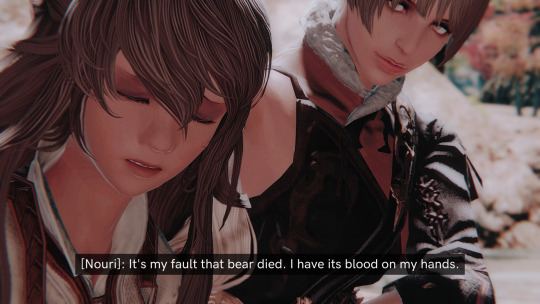
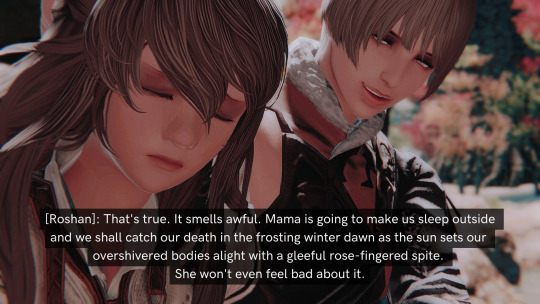
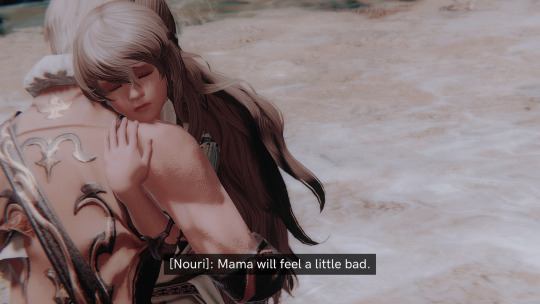
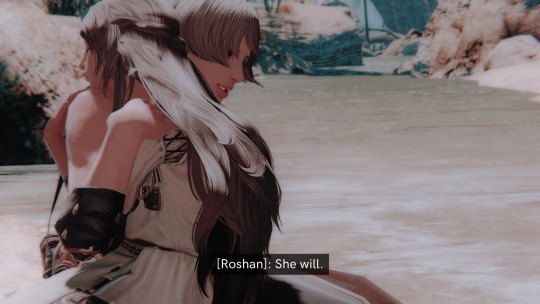
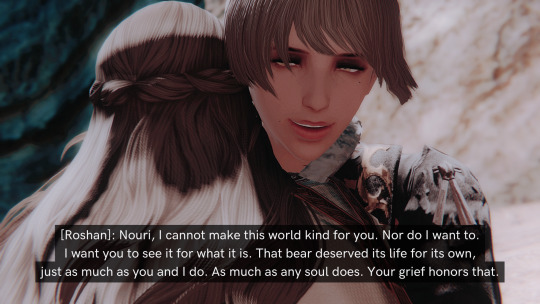
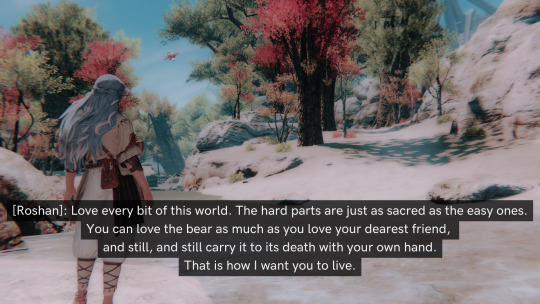
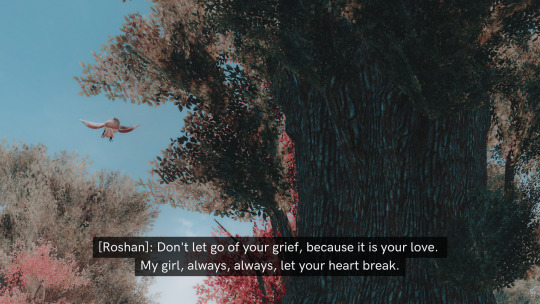
I tell you this
to break your heart,
by which I mean only
that it break open and never close again
to the rest of the world.
Mary Oliver, (New and Selected Poems Volume Two)
#astralhopes#ffxiv#nouri tahb#ffxiv cinematics#i feel so. weird about uploading my longer work since it was all formatted for twitter.
42 notes
·
View notes
Text
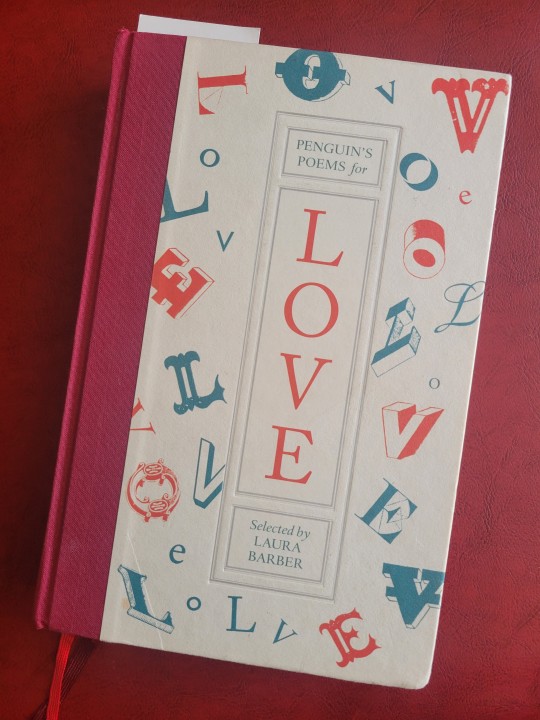
Penguin's Poems for Love. Penguin Books, 2009.
Rating: 3.5/5 stars
Genre: poetry
Series: N/A
Summary: Here are poems to take you on a journey from the 'suddenly' of love at first sight to the 'truly, madly, deeply' of infatuation and on to the 'eternally' of love that lasts beyond the end of life, along the way taking in flirtation, passion, fury, betrayal and broken hearts. Bringing together the greatest love poetry from around the world and through the ages, ranging from W. H. Auden to William Shakespeare, John Donne to Emily Dickinson, Robert Browning to Roger McGough, this new anthology will delight, comfort and inspire anyone who has ever tasted love - in any of its forms.
***Full review below.***
Since this book is a collection/anthology, my review will be structured a little different from normal.
I picked up this book after hearing it recommended by a YouTuber whose opinions on poetry I respect. As an English PhD, I'm fairly fond of poetry, and I was looking for a good collection that varied in both style and time period in which it was composed.
This collection was charming in part because it chose romantic love as its theme (the intro affirms this). Under that umbrella of romantic love, the book was divided into sections loosely defined by adverbs: suddenly, secretly, passionately, etc. It didn't make for rigid distinction between the poems, but I actually liked how nebulous each section was and that the arrangement wasn't imposing a particular reading of the poems on me.
Within those sections, there were a number of familiar names and some that were new to me. I was glad to see poets such as Sir Philip Sidney mixed in with more modern writers, as it gave me the opportunity to revisit old favorites alongside new discoveries. And as am avid lover of "old stuff," I very much appreciated the range of poetry from varying time periods, medieval to modern.
However, I do have my criticisms. For one, there were selections that I thought were incredibly odd; for example, Barber chose to include the passage from Paradise Lost in which Eve falls in love with herself and runs away from Adam. She also included a passage from Goblin Market (though not the one where Laura and Lizzy kiss). These selections sometimes made me feel like Barber was trying to force some of the heavy hitters from English Literary canon in the collection, rather than choosing poems that fit but were less popular.
For two, there were not a whole lot of prominent POC or queer poets (though there are some), which meant that the collection felt more heavily weighted towards the established canon. Maybe Barber was limited in what she chose based on copyright, but even so, it felt like some poets (such as Shakespeare, Donne, and the Brownings) were overly represented. But I should give Barber some credit; she did choose some poets who would be less familiar to an audience with a poetry background, so for that, I'm grateful.
Still, I do think this is a solid volume for anyone who might want to get into poetry for the first time or who might want to read more (if they aren't already a poetry fan). There's enough variance in style and subject matter for readers to discover their own poetic preferences and tastes, and most selections are taken from well-established poets with a lot of technical skill.
3 notes
·
View notes
Text
Here is a story
to break your heart.
Are you willing?
This winter
the loons came to our harbor
and died, one by one,
of nothing we could see.
A friend told me
of one on the shore
that lifted its head and opened
the elegant beak and cried out
in the long, sweet savoring of its life
which, if you have heard it,
you know is a sacred thing.,
and for which, if you have not heard it,
you had better hurry to where
they still sing.
And, believe me, tell no one
just where that is.
The next morning
this loon, speckled
and iridescent and with a plan
to fly home
to some hidden lake,
was dead on the shore.
I tell you this
to break your heart,
by which I mean only
that it break open and never close again
to the rest of the world.
Mary Oliver, "Lead" from New and Selected Poems Volume Two
12 notes
·
View notes
Text
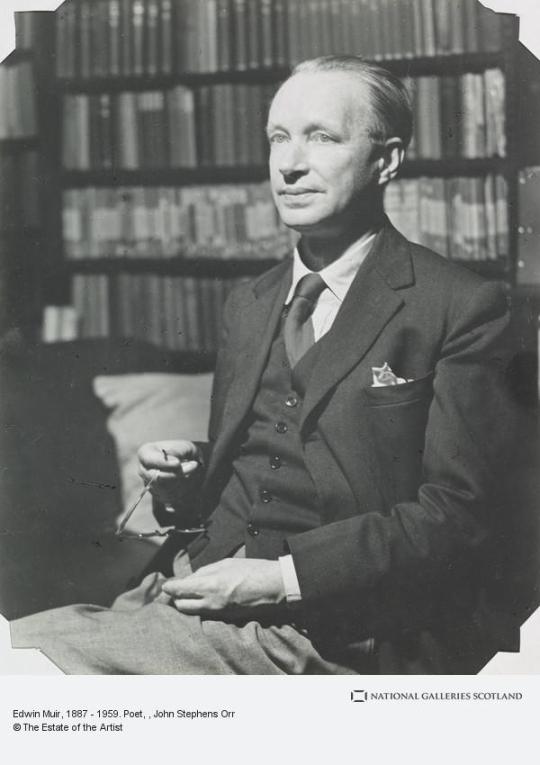
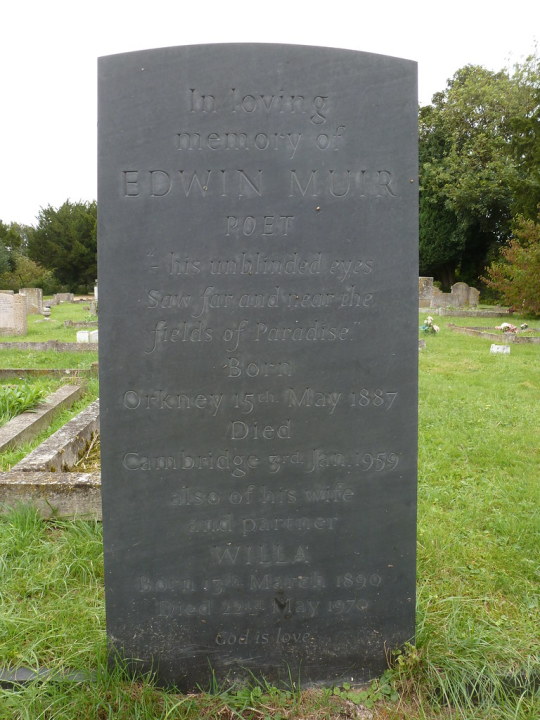
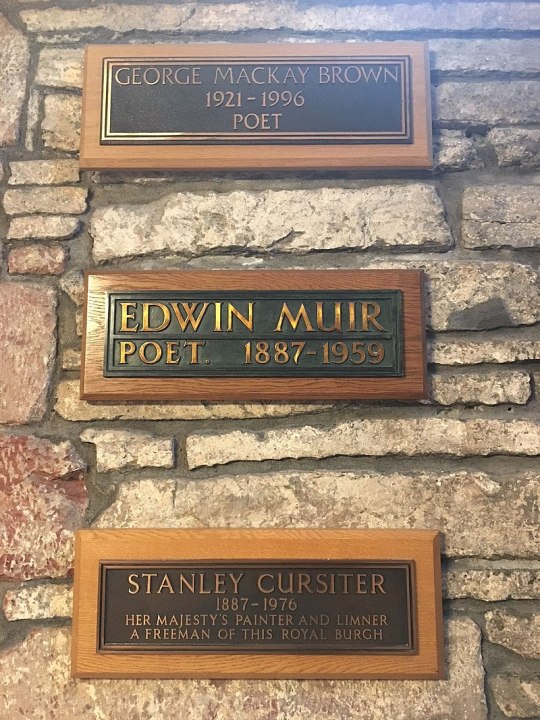
January 3rd 1959 saw the death of the poet and scholar Edwin Muir.
He was was born on a farm in Deerness , Orkney Islands in the remote northeast of Scotland. In 1901, when he was 14, his father lost the farm and the family moved to Glasgow. In Glasgow first his father, then his two brothers, and then his mother died in the space of a few years. His life as a young man in Glasgow was a depressing experience for him, involving a succession of unpleasant jobs. In 1919 he married Willa Anderson (they would later collaborate on English translations of such writers as Franz Kafka and Hermann Broch) and moved to London. From 1921 - 1923 he was in Prague, Dresden, Italy, Salzburg and Vienna; he returned to England in 1924. Between 1925 and 1956 Muir published seven volumes of poetry which were collected after his death and published in 1991 as The Complete Poems of Edwin Muir. From 1927 to 1932 he published three novels and in 1935 he came to St. Andrews where he produced his controversial Scott and Scotland (published in 1936). From 1946-1949 he was Director of the British Council in Prague and Rome. 1950 saw his appointment as Warden of Newbattle Abbey College (college for working class men) near Edinburgh and in 1955 he was made Norton Professor of English at Harvard University. He returned to England in 1956 but died in 1959 at Swaffam Priory , Cambridge and was buried near Cambridge.
His childhood in remote and unspoiled Orkney represented an idyllic "Eden" to Muir, while his family's move to the city corresponded in his mind to a deeply disturbing encounter with the "fallen" world. The emotional tensions of that dichotomy shaped much of his work and deeply influenced his life. His psychological distress led him to undergo Jungian analysis in London. A vision in which he witnessed the Creation strengthened the Edenic myth in his mind, leading him to see his life as an individual and his career as a poet as a working-out of archetypal fable. In his Autobiography he wrote, "the life of every man is an endlessly repeated performance of the life of man"; our deeds on earth constitute "a myth which we act almost without knowing it." Alienation, paradox, the existential dyads of good and evil, life and death, love and hate, and images of journeys, labyrinths, time and places fill his work.
His Scott and Scotland advanced the claim that Scotland can only create a national literature by writing in English; an opinion which placed him in direct opposition to the Lallans movement of Hugh MacDiarmid. He had little sympathy for Scottish nationalism. Remembered for his deeply felt and vivid poetry in plain, unostentatious language with few stylistic preoccupations, Muir is a relatively little known but significant modern poet. In 1965 a volume of his selected poetry was edited and introduced by T. S. Eliot. An excellent essay discussing Muir's literary career (Edwin Muir?s Journey, by Robert Richman ) is available in the online archives of The New Criterion. Many of Edwin and Willa Muir's translations of German novels are still in print.
Edwin Muir died in Cambridge on this day in 1959 and is buried in the churchyard of St Mary, Swaffham Prior, the village in which he spent his final years in Priory Cottage, directly opposite the churchyard. Muir is also remembered in St Magnus Cathedral, Kirkwall, Orkney
10 notes
·
View notes
Text
what I read in 2022
2022
We Ride Upon Sticks- Quan Barry
How to Not Be Afraid of Everything- Jane Wong
Today a Woman Went Mad in the Supermarket: Stories- Hilma Wolitzer
The Rabbit Hutch- Tess Gunty
The Daring Life and Dangerous Times of Eve Adams- Jonathan Ned Katz AND Lesbian Love- Eve Adams (in same volume)
Thistlefoot- GennaRose Nethercott
Bluest Nude- Ama Codjoe
The Master Letters- Lucy Brock-Broido (reread)
Family Lexicon- Natalia Ginzburg (tr. Jenny McPhee)
The Whole Story- Ali Smith
The Rupture Tense- Jenny Xie
Bad Rabbi: And other strange but true stories from the Yiddish press- Eddie Portnoy
A Tale for the Time Being- Ruth Ozeki
Ducks: Two Years in the Oil Sands- Kate Beaton
Wandering Stars- Sholem Aleichem (tr. Aliza Shevrin)
Moldy Strawberries- Caio Fernando Abreu (tr. Bruna Dantas Lobato)
Sarahland- Sam Cohen
Your Emergency Contact Has Experienced An Emergency- Chen Chen
Elephant- Soren Stockman
Craft in the Real World- Matthew Salesses
Life of the Garment- Deborah Gorlin
Olio- Tyehimba Jess
In This Quiet Church of Night, I Say Amen- Devin Kelly
The Wild Fox of Yemen- Threa Almontaser
Song- Brigit Pegeen Kelly
Qorbanot- Alisha Kaplan w/ art by Tobi Kahn
Gold that Frames the Mirror- Brandon Melendez
Foreign Bodies- Kimiko Hahn
A Little Devil in America- Hanif Abdurraqib
Muscle Memory- Kyle Carrero Lopez
not without small joys- Emmanuel Oppong-Yeboah
Too Bright To See & Alma- Linda Gregg
Borne- Jeff VanderMeer
Harvard Square- André Aciman
What We Talk About When We Talk About Fat- Aubrey Gordon
The City We Became- N.K. Jemison
Twenty-Eight Artists and Two Saints- Joan Acocella
Vladimir-Julia May Jonas
Everyone Knows Your Mother Is a Witch- Rivka Galchen
Lessons in Being Tender-Headed- Janae Johnson
Against Heaven- Kemi Alabi
How The Word Is Passed- Clint Smith
Earth Room- Rachel Mannheimer
True Biz- Sara Nović
Motherhood- Sheila Heti
The Fire Next Time- James Baldwin
Diary of a lonely girl or the battle against free love- Miriam Karpilove tr. Jessica Kirzane
Mezzanine- Matthew Olzmann
Customs- Solmaz Sharif
Edge of House- Dzvinia Orlowsky
Only as the Day is Long: New and Selected Poems- Dorianne Laux
DMZ Colony- Don Mee Choi
Stay Safe- Emma Hine
Spring Tides- Jacques Poulin, trn. Shira Fleishman (reread)
No One Is Talking About This- Patricia Lockwood
Unaccompanied- Javier Zamora
Where I Was From- Joan Didion
Air Raid- Polina Barskova tr. Valtzina Mort
Dispatch- Cam Awkward-Rich
Bury It- sam sax
A Cruelty Special to Our Species- Emily Jungmin Yoon
Homie- Danez Smith
Dreaming of You- Melissa Lozada-Oliva
9 notes
·
View notes
Audio
Today, the tale of how Hongo met Hirsch—inaugurating a deep poetic friendship now in its fifth decade. The prose is from Garrett Hongo’s memoir The Perfect Sound, now out in paperback; the Edward Hirsch poem appears in his recent collection Stranger by Night.
With Hirsch at the MLA
In the early 1980s, I met the poet Edward Hirsch, hilariously, at the annual conference of a professional association. I was stationed at the book fair in the ballroom of the Hilton Hotel in Los Angeles, invited there by my publisher, a university press, to share a book signing with my famed teacher, Charles Wright. Charles had published Country Music: Selected Early Poems (a book that later became co-winner of the National Book Award). I’d only just published my first “slender volume,” issued simultaneously in hard-and softcover (a rarity nowadays). The publisher’s strategy, of course, was that Charles would attract the throngs and I’d piggyback.
That day, for the first half hour or so, I think about two dozen folks had come by, singly and in pairs, buying Charles’s book and getting him to sign their copies. None had asked for mine. None had even given me or my book a glance. This was the academic crowd—university professors and poets teaching at universities, men dressed in sport coats or blazers with dress shirts over casual slacks or jeans, women in professional skirt suits or slacks and coats over blouses in muted colors. Still a graduate student and trying to fit in, I wore a brown sport coat over twill trousers and a Sta-Prest polyester dress shirt I’d bought on discount. Charles wore starched jeans pressed with a sharp crease, a blue blazer, and a plaid L.L. Bean–type shirt. On his feet were cordovan leather loafers over white socks, Michael Jackson style. Aside from Charles, we weren’t a colorful crowd. And I was getting envious and frustrated. After another few browsers drifted by, not one looking my way, I told myself I’d get in the face of the next motherfucker who walked in.
This turned out to be a tall, athletic-looking guy in jeans, a light blue dress shirt, and a gray herringbone blazer. Early thirties, six feet something, wearing a pair of beat-up New Balance running shoes. He carried a small stack of books held against his hip with one of his large hands, and walked up to Charles, who was standing at the booth’s entrance. I’d sequestered myself in a corner in front of a long table that displayed the press’s array of academic publications. The man’s hair was closely cropped on the sides, but dark brown and curly on the top of his head, sticking up a bit stylishly. He was blade-faced, like a hatchet, clean-shaven, with a prominent nose. I took him for an arrogant assistant professor at UCLA—casual, hip, rakishly rumpled, and eminently disdainful of any but the most intellectually elite. It was a type that dominated the convention, I thought. He immediately engaged Charles in an intense conversation, speaking rapidly, leaning forward, furrowing his brow, and I assumed, praising Wright’s poems, demonstrating critical prowess, holding forth the Selected Poems for Wright to sign. He’d smoothly steered my teacher against the side of the booth, facing the entrance, screening anyone away from engaging them by turning his back and sealing the two of them off like a basketball big man setting a pick in the lane. I spotted the trick right away. I admired it.
I gave up my own position by the table, then strolled up to the two of them locked in conversation on the wing of the booth. The guy was still set in his screen, his back to me, but I tapped his shoulder, my finger feeling the soft padding under the wool fabric of his coat. He turned and scowled at me with irritation.
“What is it?” he said, impatient at the interruption.
“Hey, look,” I said. “You come to the booth and you buy Charles’s book but you don’t buy mine. It’s hurting my feelings.”
“Oh, umm, what book is that?” he asked.
I showed him my paperback with its yellow cover.
“I have that book,” he said, and quickly turned to face Charles again, showing me his back. I tapped the shoulder a second time.
“Yeah,” I said, “but do you have the hardcover?” I gestured to the table behind where a couple dozen were still stacked.
When he turned, I saw that his face had broken from its scowl into a kind of innocence.
“Uhh, no I dun’t,” he said, a Chicago accent emerging in his speech.
“Well, today you get a twenty percent discount and a free signature from the author,” I said.
“Okay,” he said. “That sounds good.”
He took out a brown leather wallet, battered and compressed, faced the attendant who’d been watching us the whole time, and paid. I opened up my book and turned to the title page, planning to inscribe it with flourishes. It would be my first sale.
“Whom shall I sign this to?” I asked.
“My name is Edward Hirsch,” he said, standing over me, shoulders hunched, caught by my little gambit.
“Edward Hirsch!” I yelled. “You’re fucking Edward Hirsch? I love your poems! I love them! I read your book standing up at a bookstore every day for a week I loved them so much! You wrote ‘ “Dance You Monster to My Soft Song!” ’ You wrote ‘Walking the Upper West Side with Lorca’! I fucking love your poems! They’re so good, you piss me off!”
Hirsch’s book had come out a year before mine from a prestigious New York press, and finding it in my local university bookstore, I’d admired its marine-blue dustcover with a white window that displayed the decorous gray etching of a tree. For nearly a week, I returned to read it every day until a store clerk said to me—“Are you gonna buy it or you gonna just wear the thing out?” Shamed, I bought it, though it cost more money—nearly twenty dollars—than I could afford on my grad student stipend. But the poems were astonishing—so beautifully structured, gifted in rhetoric and memorable images, with urban settings and many about working-class people in Chicago where he’d grown up. Best of all, the emotions ran a full range, from the somber and reflective to the ecstatic. And I could tell that the man knew his stuff. I recognized influences and borrowings from poets everywhere—Spain, Chile, Philadelphia, Detroit, Paris, and San Francisco. I read echoes of the English Metaphysical poets, saw images like those of a raving Spanish Surrealist, heard shouts and murmurs in his supple poetic lines as though a bluesman were singing them, was consoled by prayers and elegies for the gone and tattered worlds of an immigrant past. This was a poet of soul with a deeply learned style, my own contemporary unmatched in skill and compassion.
His face cracked a big, wide smile, the deep furrow on his brow disappeared, and he grabbed my ears, pulling gently back and forth, saying, “O, I love you” as though he were a grandfather blessing a child.
Embarrassed but polite, our elder Charles Wright bowed away. Hirsch and I went off to lunch together, at a Chinese restaurant I knew close by, talking poetry, poetry, poetry. We shared stories of our apprenticeships in different books and cities, compared his formalist mentors and my stylishly louche ones. We talked about poets we loved, women we loved, and places we’d traveled. It turned out we’d both won the same fellowship straight out of college. He went to Eastern Europe and Russia on the trail of his ancestors and lost families. I went to Japan to do the same. After those long and parallel trails, we became brothers.
Every Poem Was a Secret
by Edward Hirsch
Every poem was a secret
struggle with himself,
every secret was a struggle,
a handwritten scrawl,
something joyous
or terrible,
a fragmentary
blood-soaked message
wrenched out of his body,
a longing for
some impossible harmony
tucked into a bottle
and tossed off the side of a cliff.
Reckless love poems, shocked elegies
drafted against death
looking for God—
some of them shattered
in desperation
on the rocks below,
but others, like this one,
bobbed away
on surging blue waves
for someone to find them.
. .
More on these books and authors:
Learn more about The Perfect Sound by Garrett Hongo and browse other books by him.
Learn more about Stranger by Night by Edward Hirsch, browse other books by him, and read his recent New York Times piece on learning to negotiate the world as he loses his eyesight.
Follow Garrett Hongo @bblilikoi on Instagram.
Hear Garrett Hongo read at the Los Angeles Times Festival of Books on April 23 (tickets required).
Visit our Tumblr to peruse poems, audio recordings, and broadsides in the Knopf poem-a-day series.
To share the poem-a-day experience with friends, pass along this link.
#HongoAudio#edward hirsch#poem a day#Knopf#knopfpoetry#knopf poetry#garrett hongo#national poetry month#the perfect sound#stranger by night#poems#poetry#poet
3 notes
·
View notes